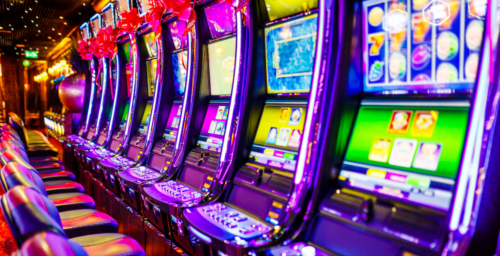Exploring the Evolution of “Pokies” Machines
Slot machines have captivated gamblers for generations, evolving from mechanical contraptions to sophisticated electronic gaming machines. While the term “slots” is widely recognized and used to refer to these popular gambling devices, a regional variation has gained prominence in certain parts of the world: “pokies.” In this blog post, we will explore the origins and reasons behind the term “pokies” and its association with slot machines, exploring its historical, cultural, and linguistic underpinnings.
 Historical Pokies Background
Historical Pokies Background
To understand the emergence of the term “pokies,” we must first explore the history of slot machines. In the late 19th century, the first mechanical gambling devices emerged. People called them “one-armed bandits” because they had a lever on the side that players pulled to activate the reels. Over time, as electronic technology replaced mechanical components, these machines became known as “slot machines” or simply “slots.” However, the evolution of terminology continued.
Introduction of the Term “Pokies”
The term “pokies” originated and gained popularity primarily in Australia and, to a lesser extent, in New Zealand. It is an abbreviation of “poker machines,” emphasizing the link between these machines and the popular card game of poker. However, in the early days, many slot machines in Australia were based on poker to achieve specific poker hands to win prizes. This connection between poker and slot machines led to the term “pokies” being widely adopted.
Pokies Cultural Context
The prevalence of gambling in Australia and New Zealand played a significant role in adopting the term “pokies” in these regions. Both countries have a long-standing tradition of gambling, and poker machines have been a prominent form of entertainment in pubs, clubs, and casinos. As gambling became ingrained in the local culture, so did the term “pokies,” reflecting the community’s familiarity and acceptance of these machines.
Regional Pokies Variations
Different regions across the globe have their terminology for slot machines, showcasing the influence of historical and cultural factors. People in the United Kingdom often call these devices “fruit machines”. This term comes from the fruit symbols that filled the reels of early slot machines. In Japan, they have “pachinko” machines, which are like slot machines but with a different way of playing. These variations in terminology highlight the unique gambling traditions and influences in different parts of the world. However, despite the diversity of names and practices, there are some common features that define gambling as a form of entertainment and risk-taking.
Linguistic Aspects
The term “pokies” has interesting linguistic aspects. It is an example of a clipped word: “poker machines” was shortened to “pokies” for convenience and brevity. This linguistic feature is common as language evolves to simplify complex phrases or names. Furthermore, “pokies” shares similarities with other gambling-related terms, such as “fruit machines” in the UK and “one-armed bandits,” which is a more nostalgic reference to the early mechanical slot machines.
Pokies Popularity and Acceptance
The widespread popularity of the term “pokies” can be attributed to various factors. Firstly, social influence and word-of-mouth played a significant role in its adoption. As people commonly referred to these machines as “pokies” in Australia and New Zealand, the term gained momentum and became deeply ingrained in the local lexicon. Additionally, marketing strategies by gambling venues and the gaming industry further solidified the usage of “pokies,” associating it with a sense of familiarity, excitement, and community engagement.
Evolution of the “Pokies” Terminology
Over time, the terminology used for slot machines has undergone shifts and changes. Technological advancements have transformed machines from mechanical to electronic, altering how people perceive and interact. Legal regulations and changing societal attitudes towards gambling have also influenced the terminology, as some regions have sought to use less enticing or more neutral terms to mitigate the potential negative connotations associated with gambling.
Comparison to Slots
While “slots” remains the dominant term for these gambling devices in many parts of the world, “pokies” is more prevalent in Australia and New Zealand. The cultural identity and historical context of each region account for this contrast. The close association of poker machines with the term “pokies” in these countries and the strong gambling traditions has solidified its usage. Therefore, in other regions, where gambling might have a different cultural significance or where the historical development of slot machines followed different paths, the term “slots” has prevailed.
Conclusion
The term holds a special place in the lexicon of gambling enthusiasts in Australia and New Zealand, embodying the cultural and historical context of these regions. Its association with poker machines and the prevalence of gambling in the local communities have contributed to its wide acceptance. While “slots” remains the dominant term worldwide, understanding the origins and reasons behind “pokies” provides insights into the fascinating intersection of language, culture, and gambling.
